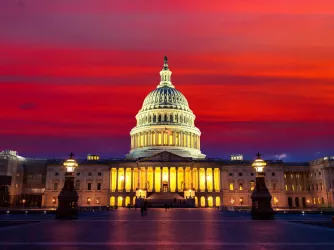Table of Contents
Phil Donahue: The man who brought robust talk to TV — an interview with Ken Paulson about the man and his legacy — First Amendment News 438
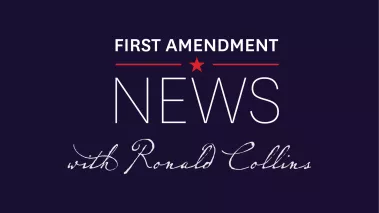
During a long car ride to Provincetown, my wife suggested we listen to a New York Times podcast on Phil Donahue (1935-2024) and his recent passing. I was marginally interested. “Sure, okay,” I replied. As I listened I became fascinated by the story of the man and his life, and especially his talk show legacy.
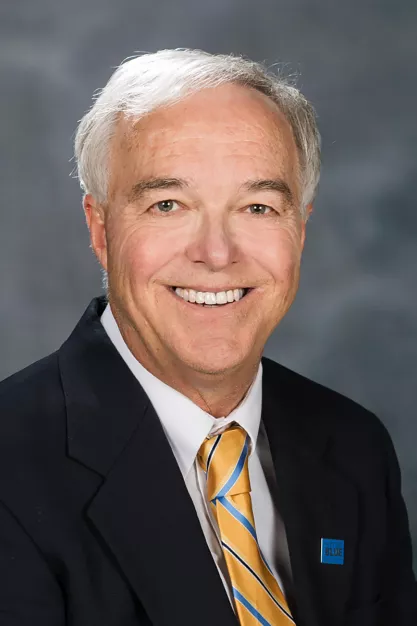
In the course of the program I noticed that my former boss at the First Amendment Center, Ken Paulson (now director of the Free Speech Center at Middle Tennessee State University), was mentioned, as was his show, “Speaking Freely.” It soon occurred to me that several of the outtake conversations with Donahue that I was hearing on this podcast might actually be from Ken’s program. And indeed they were.
What a remarkable interview Ken had conducted with Donahue — one that directed a bright light on an amazing man with a genuine commitment to free speech. I urge our readers to view that interview.
What follows is a Q&A digital exchange I recently did with Ken Paulson.
– rklc
Ronald K.L. Collins: In 2001, you conducted an amazing 30-minute interview with Phil Donahue for your weekly “Speaking Freely” program. Why, and how did it come about?
Ken Paulson: “Speaking Freely,” a show seen in more than 60 cities on PBS affiliates across the country (2000-2004), was a perfect forum for Phil Donahue. The show — a project of the First Amendment Center — had an unusual format featuring actors, artists, musicians, and authors discussing how they use their free speech. Who better to talk with than the man who brought the marketplace of ideas to daytime TV?
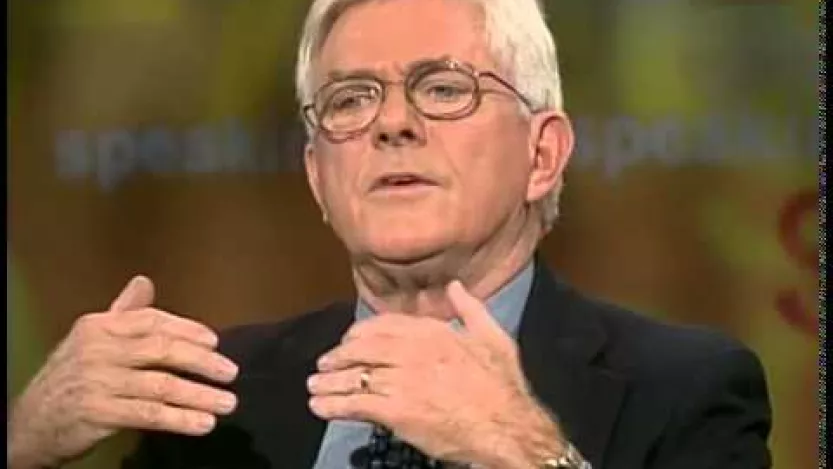
RKLC: Donahue’s WLWD-TV program first aired in 1967 and was broadcast out of Dayton, Ohio, and to a small audience. How much of his initial success was because he had yet to go national?
KP: As Donahue noted in our conversation, a local Dayton TV show had little opportunity to book celebrities, so he turned to issues instead. It was an inspired move that gave voice to audience members who, it turns out, had plenty to say. Sometimes great concepts emerge from the unlikeliest of places.
RKLC: What in your opinion was different about the “Donahue Show”? What, for example, separated it from so many other talk shows such as the later ones hosted by the likes of Jerry Springer and Geraldo Rivera?
KP: Although Donahue had shows with male strippers, most of his programs were substantive and thought-provoking. The next generation revved up the shock and titillation because that’s where the audience was.
RKLC: There was a dynamic about the Donahue show that was different from other interview-type programs. What was it, and how did his live audience fit into that calculation?
KP: The audience turned his interview show into a forum fueled by spontaneous, unpredictable and often heartfelt opinions. As Donahue proudly observed, the audiences in his studio and in homes across the country included women who felt they rarely had the opportunity to weigh in on important issues, and certainly not on television. I have old friends who had the opportunity to participate in Donahue’s audience. To a person, they posted celebrations of the man when he passed.
RKLC: As you noted in a question posed to Donahue, in one episode they actually filmed an abortion. Given the politics of our time, do you think that would be possible today on broadcast, cable, or streaming TV?
KP: I think it’s highly unlikely, but it’s interesting to note that in our conversation more than 20 years ago, Donahue said it was no longer possible even then. He also observed in 2001 that television news was facing great pressure to be “popular,” informing while also entertaining.
RKLC: At one point in your interview Donahue said, “What we were doing was bringing democracy to television.” Can you elaborate on that?
KP: It’s a nice line, but I think his show actually brought diversity to television. That included diversity of gender, race, religion, lifestyle and thought. That was an important accomplishment.
RKLC: In the course of your interview Donahue argued that “those who go too far too often will fall of their own weight.” But if that “consideration” evolves into simply bizarre entertainment value designed to shock people, then weighty programs like the Donahue one will die. Isn’t that what happened when his network show was canceled in 1996? It seems that the days of interest in serious interviews with the likes of Malcolm X, Noam Chomsky, Vladimir Pozner, and Ayn Rand had ended. What is your sense of this and what does it say about the enlightenment ideal of the First Amendment?
KP: What happens to the marketplace of ideas when serious ideas aren’t very marketable? What happens to free speech if we aren’t willing to listen? What happens to freedom of the press when people stop reading and watching because they were told to? The Enlightenment ideal presupposes that society will engage in a robust give-and-take and that the best ideas will prevail. We’re on a precarious path.
For an uninhibited yet revealing exchange in Donahue’s TV history, see his 1979 interview with author and philosopher Ayn Rand, especially the moment at 27:48 minutes into the program when Donahue takes a question from a woman in the audience.
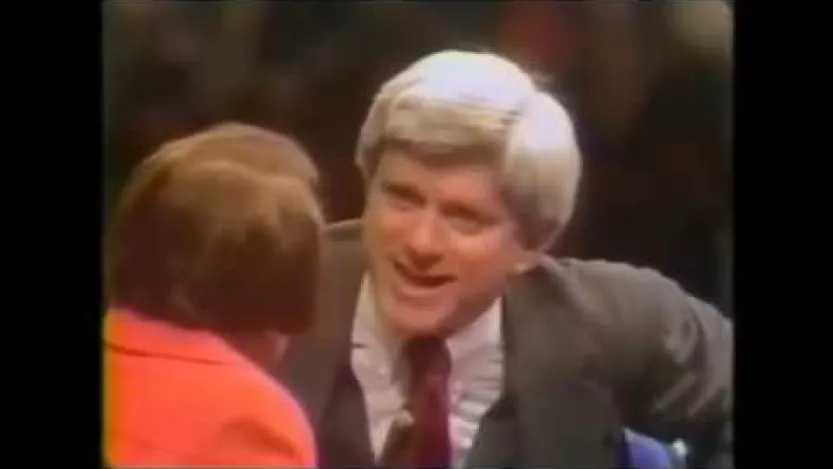
RKLC: As robust as he was on free speech, Phil Donahue conceded, “I announced myself as an absolutist. It took me a while to realize you can’t be an absolutist.” What does that tell you about First Amendment ideals coming from a man who so boldly embraced the Madisonian principle of free speech?
KP: It seems as though the definition of “absolutist” has changed over the years. I thought it was interesting that Donahue pointed to child pornography as the one example of where he couldn’t be an absolutist. It was a modest admission, given that child pornography is illegal and exploits defenseless children. Many of today’s self-described absolutists say they embrace all speech, regardless of merit, impact or harm, defending misinformation and attacks on races, faith, and gender. That’s a very different take than Donahue’s.
RKLC: At times Donahue was emphatic: “We will not chill people from saying unpopular things at times when others are screaming, ‘Shut up, shut up.’” That’s ironic since that seems to explain his TV demise, when his MSNBC cable TV program was canceled for, among other reasons, being too controversial. What was it that made it so and what does that say about commercial TV?
KP: In this instance, it may actually say more about America in the years after 9/11. It has been suggested that Donahue’s MSNBC show was canceled because he was perceived as a highly visible liberal at a time when the nation appeared to be shifting to conservatism and an imminent war in Iraq. This was the same period when the Dixie Chicks’ career imploded after lead singer Natalie Maines mocked President Bush from a stage in London.
From today’s perspective, though, there’s irony in Donahue’s efforts to protect controversial speech. Has there ever been a more hated — and more adored — television network than Fox News? It turns out that controversial and provocative speech is quite profitable if it’s exactly what tens of millions of people really want. As Donahue noted in 2001, it’s popularity — regardless of approach — that keeps broadcasters in business.
Thank you, my friend, for agreeing to do this Q&A, and congratulations on what was truly a remarkable interview with a remarkable man.
Related
- Ralph Nader, “Phil Donahue (1935-2024) – Greatest Champion of Free Speech for the Peoples’ Interest of the 20th Century,” CounterPunch (Aug. 26)
I’ve called Phil Donahue the greatest DEFENDER and ENABLER of the First Amendment’s protection of free speech, petition and assembly in the 20th Century. Hands down.
- Maya Salam, “3 Episodes That Explain Phil Donahue’s Daytime Dominance,” The New York Times (Aug. 19)
- Esther Newton, “My Date with Phil Donahue: A Queer Intellectual in TV-Land,” in Ellen Lewin and William Leap, eds., “Out in Public: Reinventing Lesbian/Gay Anthropology in a Globalizing World” (2009)
- Jeff Passe, “Phil Donahue: An Excellent Model for Leading a Discussion,” Journal of Teacher Education (Vol. 35, #1, Jan. 1984)
Court revives Palin defamation suit against The New York Times
- “Court Revives Sarah Palin’s Libel Lawsuit Against The New York Times,” First Amendment Watch (Aug. 29)
A federal appeals court revived Sarah Palin’s libel case against The New York Times on Wednesday, citing errors by a lower court judge, particularly his decision to dismiss the lawsuit while a jury was deliberating.
The 2nd U.S. Circuit Court of Appeals in Manhattan wrote that Judge Jed S. Rakoff’s decision in February 2022 to dismiss the lawsuit mid-deliberations improperly intruded on the jury’s work.
It also found that the erroneous exclusion of evidence, an inaccurate jury instruction and an erroneous response to a question from the jury tainted the jury’s decision to rule against Palin. It declined, however, to grant Palin’s request to force Rakoff off the case on grounds he was biased against her. The 2nd Circuit said she had offered no proof.
The libel lawsuit by Palin, a onetime Republican vice presidential candidate and former governor of Alaska, centered on the newspaper’s 2017 editorial falsely linking her campaign rhetoric to a mass shooting, which Palin asserted damaged her reputation and career.
Election deniers ordered to pay $1M in voting machine case
- Zachary Cohen, “2020 election deniers ordered to pay $1 million in Pennsylvania voting machine dispute,” CNN (Sept. 2)
A Pennsylvania judge has determined that three 2020 election deniers must pay nearly $1 million in fees as the result of a years-long legal dispute with state officials over voting equipment used during the last presidential race, according to recent court filings.
Recommendations from the judge, who was appointed to serve as a special master overseeing the case, attach a dollar figure to sanctions previously imposed by the state’s Supreme Court against two Republican county commissioners and their attorney for allowing an outside firm to examine voting equipment after the 2020 election — despite a court order prohibiting them from doing so, according to the new filings.
The case, which dates back to 2021, involves actions taken by two Fulton County, Pennsylvania, commissioners — Stuart Ulsh and Randy Bunch — who sought to have Dominion voting equipment examined by a third party after the 2020 election. Many of former President Donald Trump’s allies falsely blamed Dominion’s software for his election defeat.
Thomas Carroll, an attorney who also served as a pro-Trump fake elector in 2020, was also sanctioned by the Pennsylvania Supreme Court for his conduct and — along with the county and the county commissioners — “shall be jointly and severally responsible” for paying nearly $1 million in fees to cover the Pennsylvania Secretary of State’s legal bills, according to the special master’s latest report.
Related
- Matthew Rozsa and Jay Bhattacharya, “Can a Professor and Political Journalist Be Friends? A Call for Civility and Non-Violence in American Politics,” The Illusion of Consensus (Aug. 31)
Keeping free speech away from political conventions

- Megan Myers, “How Milwaukee and Chicago circumvented free speech at the RNC and DNC,” FIRE (Aug. 30)
How were protesters kept so far from the action?
The story begins after the RNC announced that its convention would be held in Milwaukee. On April 12, 2023, more than a year before the event took place, the Coalition to March on the RNC applied for a permit to demonstrate. After more than a year of waiting, it had still not been approved. The American Civil Liberties Union of Wisconsin filed a lawsuit against the City of Milwaukee on behalf of a coalition of at least 71 organizations, alleging that Milwaukee’s broad restrictions on First Amendment activity were unconstitutional.
In the lawsuit filed on June 5, the coalition alleged that Milwaukee passed rules that infringed on protesters’ rights, including an ordinance passed in March that allowed the city to hold off on granting permits and disclosing official march routes until the eleventh hour. Less than six weeks ahead of the convention, the coalition still had not been given notice about its demonstration permit and parade route, the lawsuit stated.

‘So to Speak’ podcast: Teaching ‘conservatism’ to liberal students
- “Teaching conservatism on a liberal college campus,” FIRE (Aug. 29)
Can a course on conservatism shake up the liberal status quo on campus?
Tufts University professor Eitan Hersh presents his unique class on American conservatism and its impact on campus free speech and open dialogue. He discusses the challenges and opportunities of teaching conservative thought in a predominantly liberal academic environment.
Eitan Hersh is a professor of political science. He earned his Ph.D. from Harvard University in 2011 and was a faculty member at Yale University from 2011-2017.
In March, professor Hersh's course on conservatism was profiled in Boston Magazine under the headline, "A Conservative Thought Experiment on a Liberal College Campus.”
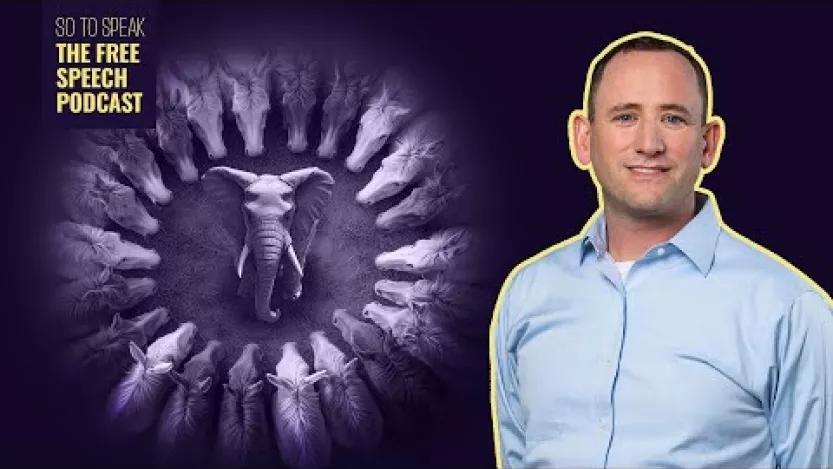
Dorf on Volokh and free speech
- Michael Dorf, “Free Speech Versus Antidiscrimination in the Scholarship of Eugene Volokh,” Constitutional Commentary (forthcoming)
Conflicts between free speech and antidiscrimination law make up a substantial subset of Eugene Volokh's wide-ranging scholarship. That work includes:
- criticism of those courts that have interpreted expression that would otherwise be protected under the First Amendment as triggering liability for the creation of a hostile workplace environment under Title VII;
- views about the proper scope of constitutionally required exceptions to public accommodations laws for expressive businesses;
- disagreement with the common assumption that boycotts themselves, as distinct from any accompanying expression, are constitutionally protected free speech;
- and bold positions on recent clashes between free speech and Title VI on college and university campuses.
Canvassing this portion of Volokh's oeuvre, one sees libertarian instincts but also a genuine appreciation for competing egalitarian concerns. Even when one finds Volokh's bottom line ultimately unpersuasive, one cannot gainsay his clarity of thought, originality, or fearlessness.
Video free speech flashback: William F. Buckley interviews Alan Dershowitz (1976)
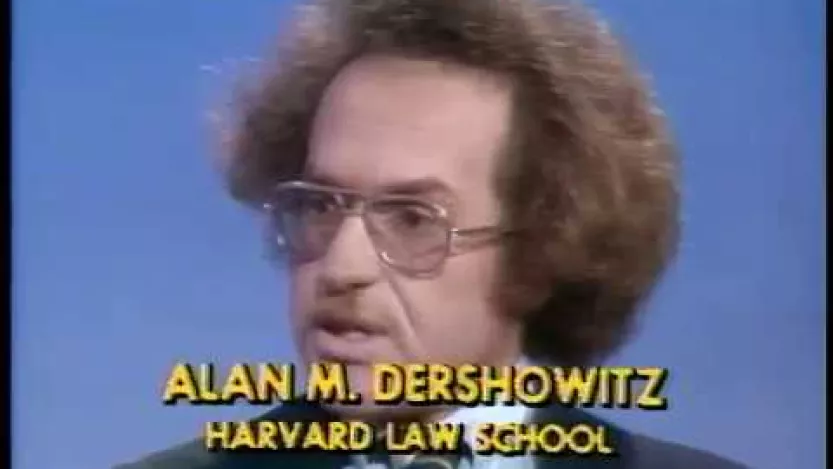
More in the news
- Eugene Volokh, “Hawaii Law Mandating Sealing of All ‘Medical and Health Records’ Unconstitutional,” The Volokh Conspiracy (Sept. 1)
- Max Schanzenbach and Kimberly Yuracko, “Law professors: Northwestern University must embrace the First Amendment standard of speech,” The Chicago Tribune (Aug.30)
- Isabel Cleary and Mark Feurborn, “Columbus whistleblower lawsuit violates First Amendment, digital rights group says” NBC4 (Aug. 30)
- Eugene Volokh, “X's Lawsuit Against Media Matters Can Go Forward,” The Volokh Conspiracy (Aug. 30)
- “After Diversity Pushback, Some Faculty Feel Left in Dark at North Carolina’s Flagship University,” First Amendment Watch (Aug. 30)
- Eugene Volokh, “‘Let's Go Brandon’ T-Shirts Can Be Barred from Middle School on Grounds of Vulgarity,” The Volokh Conspiracy (Aug. 23)
2023-2024 SCOTUS term: Free expression and related cases
Cases decided
- O’Connor-Ratcliff v. Garnier
- Speech First, Inc. v. Sands (certiorari granted, judgment re the bias policy claims vacated, and case remanded to the Court of Appeals for the 4th Circuit with instructions to dismiss those claims as moot) (Thomas and Alito, dissenting)
- National Rifle Association of America v. Vullo
- Vidal v. Elster
- Gonzalez v. Trevino (vacated and remanded, per curiam with Alito, Kavanaugh, and Jackson (joined by Sotomayor) concurring in separate opinions and Thomas dissenting)
- Murthy v Missouri (decided on Art. III standing grounds)
- Moody v. NetChoice, LLC and NetChoice, LLC v. Paxton
Review granted
Pending petitions
- Henderson v. Texas
- Murphy v. Schmitt
- Villarreal v. Alaniz
- No on E, San Franciscans Opposing the Affordable Care Housing Production Act, et al. v. Chiu
State action
- Lindke v. Freed (Barrett, J., 9-0: “The state-action doctrine requires Lindke to show that Freed (1) had actual authority to speak on behalf of the State on a particular matter, and (2) purported to exercise that authority in the relevant posts. To the extent that this test differs from the one applied by the Sixth Circuit, we vacate its judgment and remand the case for further proceedings consistent with this opinion.”)
- O’Connor-Ratcliff v. Garnier (Per Curiam: 9-0: “We granted certiorari in this case and in Lindke v. Freed (2024), to resolve a Circuit split about how to identify state action in the context of public officials using social media. Because the approach that the Ninth Circuit applied is different from the one we have elaborated in Lindke, we vacate the judgment below and remand the case to the Ninth Circuit for further proceedings consistent with our opinion in that case.”)
Review denied
- In Re First Choice Women's Resource Centers, Inc.
- Pierre v. Attorney Grievance Commission of Maryland
- O’Handley v. Weber
- Frank v. Lee
- Mckesson v. Doe (Separate statement by Sotomayor, J.)
- Brokamp v. James
- Griffin v. HM Florida-ORL (application for stay denied)
- M. C. v. Indiana Department of Child Services
- Spectrum et al v. Wendler
- Porter v. Martinez
- Molina v. Book
- Porter v. Board of Trustees of North Carolina State University
- NetChoice, LLC v. Moody
- Alaska v. Alaska State Employees Association
- X Corp. v. Garland
- Tingley v. Ferguson (Justice Kavanaugh would grant the petition for a writ of certiorari. Justice Thomas, dissenting from the denial of certiorari. (separate opinion) Justice Alito, dissenting from the denial of certiorari. (separate opinion))
- Jarrett v. Service Employees International Union Local 503, et al
- Sharpe v. Winterville Police Dept.
- Winterville Police Department v. Sharpe
- Stein v. People for the Ethical Treatment of Animals, Inc., et al.
- Blankenship v. NBCUniversal, LLC
- Center for Medical Progress v. National Abortion Federation
- Frese v. Formella
- Mazo v. Way
Free speech related
- Miller v. United States (judgment vacated, and case remanded) (statutory interpretation of 18 U.S.C. § 1512(c) advocacy, lobbying and protest in connection with congressional proceedings)
- Fischer v. United States (vacated and remanded, 6-3 per Roberts with Barrett, Sotomayor and Kagan dissenting: To prove a violation of §1512(c)(2), the Government must establish that the defendant impaired the availability or integrity for use in an official proceeding of records, documents, objects, or other things used in an official proceeding, or attempted to do so.)
Last scheduled FAN
FAN 437: “Lower the First Amendment flags to half-mast in memory of Bruce E.H. Johnson (1950-2024)”
This article is part of First Amendment News, an editorially independent publication edited by Ronald K. L. Collins and hosted by FIRE as part of our mission to educate the public about First Amendment issues. The opinions expressed are those of the article’s author(s) and may not reflect the opinions of FIRE or Mr. Collins.
Recent Articles
FIRE’s award-winning Newsdesk covers the free speech news you need to stay informed.

One day after FIRE lawsuit, Congress passes changes to filming permits in national parks

VICTORY: FIRE lawsuit leads California to halt law penalizing reporters, advocates, and victims who discuss publicly known information about sealed arrest records

O holy fight: New Hampshire Satanic Temple statue threatened by more than vandals
